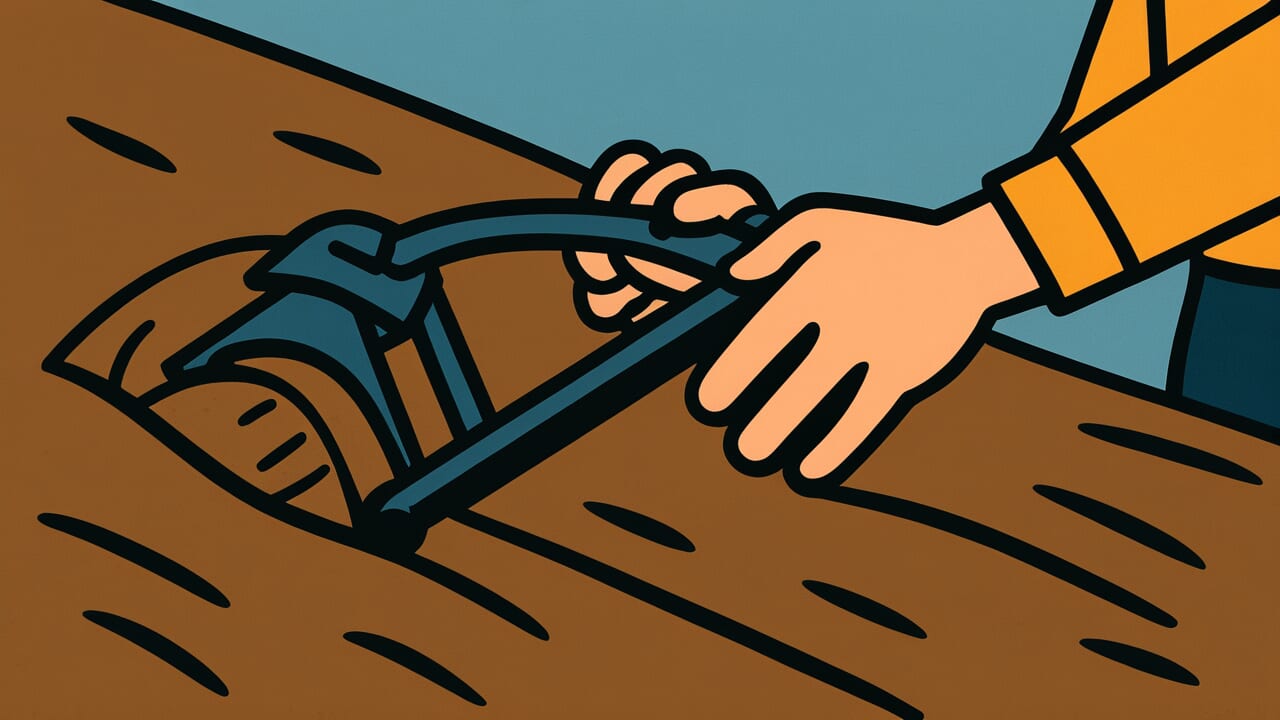How to Read “put one’s hand to the plough”
“Put one’s hand to the plough”
[put wunz hand too thuh plow]
The word “plough” is sometimes spelled “plow” in American English.
Meaning of “put one’s hand to the plough”
Simply put, this proverb means committing fully to a task and seeing it through to completion.
The literal words paint a picture of farming work. When you put your hand to the plough, you grab the handles. You guide it through the soil to prepare for planting. This requires steady focus and strength to keep the furrows straight.
The deeper message is about dedication and follow-through. Once you start something important, you should finish it properly. Half-hearted efforts often lead to poor results. The saying reminds us that worthwhile achievements require sustained commitment.
Today we use this phrase when someone takes on serious responsibility. It applies to starting a new job, beginning a difficult project, or making major life changes. The wisdom suggests that once you begin, you should give your full attention and effort until the work is done.
Origin and Etymology
This proverb has biblical origins, appearing in the New Testament. The exact phrase comes from the Gospel of Luke in Christian scripture. It was recorded as part of teachings about commitment and dedication.
The saying emerged from an agricultural society where farming was central to survival. Ploughing was essential spring work that prepared fields for crops. Poor ploughing meant poor harvests, which could mean hunger. The work demanded complete attention and steady hands.
The phrase spread through Christian communities and eventually entered common speech. Over centuries, it moved beyond religious contexts into everyday language. People began using it for any situation requiring serious commitment. The farming metaphor remained powerful even as fewer people worked the land.
Interesting Facts
The word “plough” comes from Old English “ploh,” which meant the farming tool itself. This connects to similar words in other Germanic languages, showing the tool’s importance across northern Europe.
Biblical scholars note that the original text used farming imagery that listeners would immediately understand. Most people in that era worked with soil and crops daily.
The phrase uses the specific action of “putting hand to” rather than just “using” the plough. This emphasizes the physical commitment and personal involvement required for the task.
Usage Examples
- Manager to employee: “The project deadline is tight, but once we commit to the client, we need to put one’s hand to the plough.”
- Parent to teenager: “You can’t quit guitar lessons after two weeks – you need to put one’s hand to the plough.”
Universal Wisdom
This proverb captures a fundamental tension in human nature between our desire for quick results and the reality that meaningful work takes time. We naturally want to see immediate progress, but most valuable achievements require sustained effort over long periods. The plough metaphor reveals why our ancestors understood this truth so clearly.
In agricultural societies, the connection between consistent work and survival was obvious. You could not plough half a field and expect a full harvest. You could not abandon the work when your arms got tired or when the weather turned difficult. The seasons moved forward whether you were ready or not, and incomplete preparation meant real consequences.
This wisdom addresses our tendency to lose motivation when initial enthusiasm fades. Every generation discovers that starting something feels exciting, but continuing through the difficult middle portions tests our character. The proverb suggests that true commitment begins not when we feel inspired, but when we choose to persist despite obstacles. Our ancestors recognized that the moment we “put hand to plough” is the moment we accept responsibility for seeing something through to its natural conclusion.
When AI Hears This
Humans create clever traps for their own future selves. When someone starts plowing, they make quitting much harder. They tell others about their plans. They invest time and energy upfront. This creates social pressure and wasted effort if they stop. The person deliberately boxes themselves in to fight their own weakness.
This reveals something profound about human self-knowledge. People know they will want to quit when things get tough. They understand their own inconsistency better than they admit. So they build barriers against their future doubts before those doubts arrive. It’s like locking away the key to prevent tomorrow’s temptation. Humans outsmart their own changing minds.
What fascinates me is how this “weakness” becomes incredible strength. Humans evolved to recognize their own flaws and work around them. They turn self-doubt into commitment tools. They transform social pressure into personal power. This isn’t irrational behavior – it’s brilliant self-engineering. Humans have learned to make their own inconsistency work for them instead of against them.
Lessons for Today
Living with this wisdom means recognizing the difference between casual interest and genuine commitment. When we truly put our hand to the plough, we accept that there will be difficult days ahead. We acknowledge that our initial enthusiasm will fade and that progress may feel slow. Understanding this helps us prepare mentally for the long journey rather than expecting constant excitement.
In relationships and collaborations, this wisdom helps us recognize when others are truly committed versus when they are simply exploring options. People who have genuinely put their hand to the plough show up consistently, especially when things get challenging. They focus on the work itself rather than constantly evaluating whether they want to continue.
The most practical insight is learning to choose our commitments carefully, knowing that each serious undertaking deserves our full attention. This means saying no to some opportunities so we can say yes completely to others. The plough cannot be guided properly if we are looking over our shoulder at other fields. When we do choose to begin something important, we can draw strength from knowing that steady, persistent effort almost always produces results, even when progress feels invisible day by day.



Comments